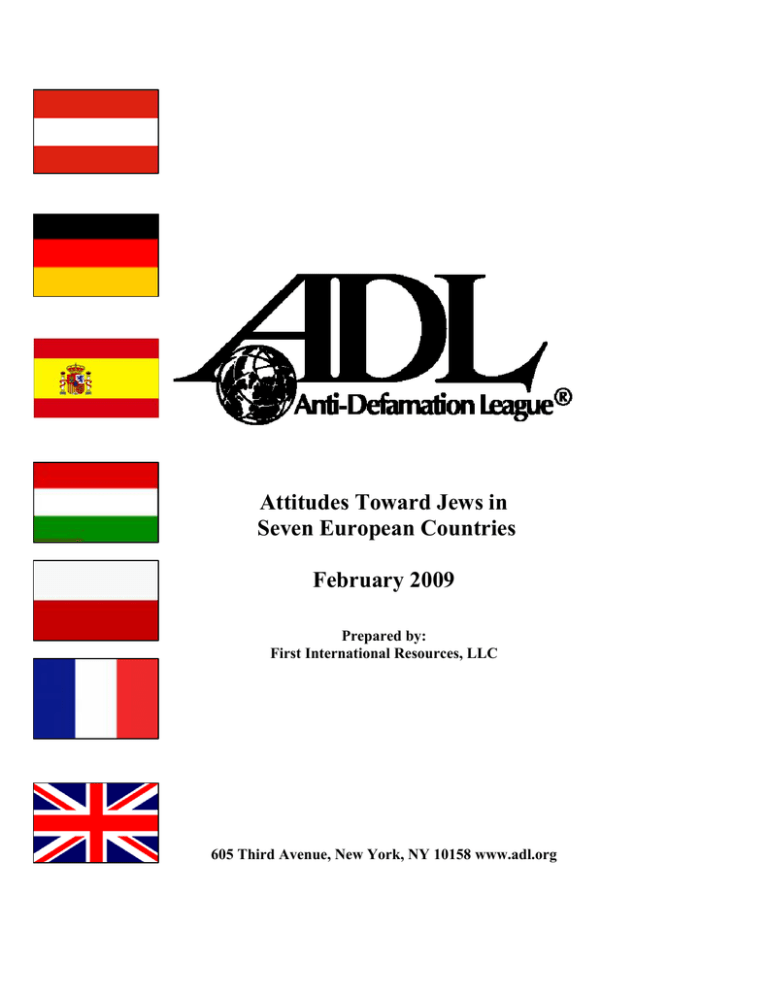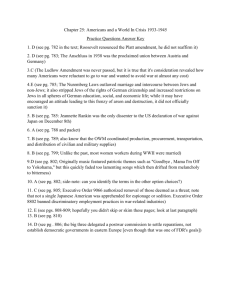Attitudes Toward Jews in Seven European Countries
advertisement

Attitudes Toward Jews in Seven European Countries February 2009 Prepared by: First International Resources, LLC 605 Third Avenue, New York, NY 10158 www.adl.org 2 Table of Contents Methodology 3 Anti-Semitism in Europe 4 Global Financial Crisis 16 Trends in Anti-Semitic Attitudes -Country by Country Results 17 3 Methodology ¾ First International Resources was commissioned by the AntiDefamation League to research attitudes and opinions toward Jews, the Middle East and the global financial crisis in seven European countries. ¾ Our research focused on the attitudes of the general public in Austria, France, Hungary, Poland, Germany, Spain and the United Kingdom. ¾ Data results for each individual country were weighted based on age and gender. The completed interview data underwent minor weighting to national population data using official government information on age and gender. ¾ In addition to the individual country results, we have compiled overall statistics which take into account the findings from the seven countries surveyed as a whole. These figures are combined results from our surveys, with each country’s findings being weighted equally as one-seventh of the whole. ¾ Fieldwork was done by Taylor Nelson Sofres (TNS), which conducted a total of 3,500 telephone interviews -- 500 in each of the seven countries -- among the general public between December 1, 2008 – January 13, 2009. ¾ Interviews were conducted in the native language of each of the countries and were completed by TNS. ¾ The margin of error for each country is +/- 4 at 95% level of confidence. 4 Anti-Semitism in Europe As with previous surveys, data from this latest 2009 European tracking poll indicates that significant percentages of European respondents continue to believe in some of the most pernicious anti-Semitic stereotypes. Respondents across the continent were asked whether or not they thought the following four statements were “probably true” or “probably false.” 1) Jews are more loyal to Israel than to this country. 2) Jews have too much power in the business world. 3) Jews have too much power in international financial markets. 4) Jews still talk too much about what happened to them in the Holocaust. Respondents were also asked: Whether they agree or disagree with the statement that “Jews are responsible for the death of Christ.” Finally, respondents were asked if their opinion of Jews was influenced by actions taken by the State of Israel and whether they believed the violence directed against European Jews was a result of anti-Jewish feelings or anti-Israel sentiment. 5 (1) Jews are more loyal to Israel than to this country. Percent responding “probably true” 80% 63% 60% 64% 53% 47% 40% 38% 40% 37% 20% 0% Austria France Germany Hungary Poland Spain United Kingdom ¾ The data indicate that Europeans continue to question the loyalty of their Jewish citizens. ¾ Overall, nearly half of those surveyed in the seven countries, 49 percent, believe that Jews are more loyal to Israel than to their own country. ¾ A majority of respondents in Germany, Poland and Spain believe that this statement is “probably true.” 6 (2) Jews have too much power in the business world. Percent responding “probably true” 80% 67% 60% 40% 55% 36% 56% 33% 21% 20% 15% 0% Austria France Germany Hungary Poland Spain United Kingdom ¾ High levels of those surveyed across Europe continue to believe in the traditional anti-Jewish canard that “Jews have too much power in the business world.” ¾ Overall, 40 percent of all respondents believe this stereotype to be true. ¾ More than half of Hungarian, Spanish and Polish respondents believe that “Jews have too much power in the business world.” 7 (3) Jews have too much power in international financial markets. Percent responding “probably true” 80% 74% 59% 60% 40% 54% 37% 27% 22% 20% 15% 0% Austria France Germany Hungary Poland Spain United Kingdom ¾ Similarly, respondents in the seven countries still adhere to the notion that “Jews have too much power in international financial markets.” ¾ Overall, 41 percent of those surveyed cling to the traditional stereotype that Jews exert too much influence over international financial markets. ¾ Nearly three-quarters of those surveyed in Spain believe the above statement to be “probably true.” 8 (4) Jews still talk too much about what happened to them in the Holocaust. Percent responding “probably true” 80% 60% 56% 55% 55% 45% 40% 42% 33% 20% 20% 0% Austria France Germany Hungary Poland Spain United Kingdom ¾ Large percentages of respondents across Europe believe that Jews still talk too much about what happened to them in the Holocaust. ¾ Overall, 44 percent of those surveyed believe it is “probably true” that Jews still talk too much about the Holocaust. 9 The following chart illustrates the percentage of those surveyed in each country who answered “probably true” to at least 3 of the following traditional anti-Semitic stereotypes: 1) Jews are more loyal to Israel than to this country. 2) Jews have too much power in the business world. 3) Jews have too much power in international financial markets. 4) Jews still talk too much about what happened to them in the Holocaust 80% 60% 47% 48% 48% 40% 30% 20% 20% 20% 10% 0% Austria France Germany Hungary Poland Spain United Kingdom ¾ Overall, nearly one-third of those surveyed, 32 percent, believe that at least three of the above statements are “probably true,” while 15 percent believe that all four are “probably true.” ¾ In fact, 28 percent of Polish respondents, 20 percent of Spanish respondents, 18 percent of Hungarian respondents and 17 percent of French respondents believe that all four of the above statements are “probably true.” 10 ¾ Moreover, the data indicate that age, education and income level are key factors in determining the likelihood of a respondent believing in the traditional anti-Semitic stereotypes tested. ¾ Those over the age of 65, those who did not continue their education beyond the age of 17 and those earning less than €11,000 are more likely than the rest of the population to agree with at least three of the four anti-Semitic characterizations presented in the survey. ¾ The following table illustrates this trend in the seven countries surveyed. Percentage responding “probably true” to at least three of the four anti-Semitic stereotypes tested 30% 45% Austria Overall Population 50% 38% 20% 30% France 34% 32% Age 65+ 20% 32% 30% 26% Germany 47% 53% Hungary Did not continue education beyond 17 65% 50% 48% 56% Poland 68% 55% Earn less than €11,000 48% 59% 54% 55% Spain 10% United Kingdom 0% 22% 15% 18% 20% 40% 60% 80% 100% 11 (5) The Jews are responsible for the death of Christ. Percent responding “strongly agree” + “somewhat agree” 60% 48% 40% 33% 21% 20% 19% 17% 15% 11% 0% Austria France Germany Hungary Poland Spain United Kingdom ¾ A significant percentage of those surveyed continue to blame Jews for the death of Christ. ¾ Overall, 23 percent agree with the statement that “Jews are responsible for the death of Christ.” ¾ Nearly half of Polish respondents, 48 percent, agree with this statement -- the highest percentage of all the countries surveyed. 12 (6a) Is your opinion of Jews influenced by actions taken by the State of Israel? Percent responding “yes” 40% 36% 28% 25% 23% 20% 20% 15% 12% 0% Austria France Germany Hungary Poland Spain United Kingdom ¾ Overall, 23 percent of those surveyed say that their opinion of Jews is influenced by the actions taken by the State of Israel. 13 Respondents who answered “yes” in the previous question were then asked the following: (6b) Is your opinion of Jews better or worse? Percent responding “worse” 80% 74% 66% 60% 57% 60% 47% 47% 47% 40% 20% 0% Austria France Germany Hungary Poland Spain United Kingdom ¾ Overall, of those respondents whose opinions are influenced, 58 percent say that their opinion of Jews is worse as a result of the actions taken by Israel. ¾ Respondents in Spain (74 percent) and the United Kingdom (66 percent) are most likely to view Jews more negatively as a result of actions taken by the State of Israel. 14 (7) In your opinion, is the violence directed against Jews in (insert individual country name) a result of anti-Jewish feelings or a result of anti-Israel sentiment? 60% 48% 48% 39% 40% 39% 38% 37% 30% 25% 22% 20% 0% 26% 25% 17% Austria France Germany Anti-Israel Sentiment Hungary 26% 17% Poland Spain United Kingdom Anti-Jewish Feelings ¾ Overall, 38 percent of those surveyed believe that the violence directed against Jews is a result of anti-Jewish feelings, while 24 percent believe it is a result of anti-Israel sentiment. ¾ Hungarian and Polish respondents are most likely to believe that anti-Jewish sentiment is the reason behind the violence directed against Jews in their two countries. ¾ Spain is the only country in which more respondents cited antiIsrael sentiment as opposed to anti-Jewish feelings as the main cause of the violence directed against Jews. 15 8) Do you think your government is doing enough to ensure the safety and security of its Jewish citizens? 80% 71% 68% 60% 60% 54% 51% 52% 46% 40% 27% 26% 21% 20% 16% 23% 18% 12% 0% Austria France Germany Yes Hungary Poland Spain United Kingdom No ¾ Overall, 57 percent of respondents believe that their government is doing enough to ensure the safety and security of its Jewish citizens. ¾ Austrian and German respondents are most likely to think that their government is providing enough protection for its Jewish citizens. ¾ More than a quarter of respondents in Hungary and Poland do not believe that their respective government is doing enough to ensure the safety of its Jewish citizenry. 16 Global Financial Crisis ¾ Despite the complexities of the current global economic environment, survey data indicate that Jews receive a disturbing amount of blame for the financial crisis. ¾ Overall, 31 percent of respondents across Europe blame Jews in the financial industry either “a great deal,” “a good amount” or “a little” for the current global economic crisis. How much blame do you place on Jews in the financial industry for the current global economic crisis? Do you blame them a great deal, a good amount, a little or not at all? Percent responding “a great deal,” “a good amount” or “a little” 60% 46% 43% 38% 40% 30% 25% 20% 16% 15% 0% Austria France Germany Hungary Poland Spain United Kingdom 17 Trends in Anti-Semitic Attitudes -Country by Country Results In 2007, the Anti-Defamation League conducted similar surveys of attitudes toward Jews in each of these seven countries. The following section compares results from the 2007 survey with results from the recently completed 2009 tracking survey. ¾ A comparison with the 2007 survey indicates that over the past two years levels of anti-Semitism have remained steady in six of the seven countries tested. ¾ The United Kingdom was the only country in which there was a marked decline in the percentage of respondents who believe that at least three of the four anti-Semitic stereotypes are “probably true.” ¾ The percentage of those believing that “Jews have too much power in the business world” has increased by 7 percent in Hungary, 6 percent in Poland and 5 percent in France. ¾ Since 2007, there has been a 6 point increase in the percentage of Spanish respondents who believe that “Jews have too much power in international financial markets.” In fact, nearly three-quarters of Spanish respondents now believe this stereotype to be “probably true.” ¾ As in 2007, respondents continue to regard “anti-Jewish feelings” as the main cause of the violence directed against Europe’s Jews as opposed to “anti-Israel sentiment.” 18 Austria Percent responding “probably true” to each statement 47% Jews are more loyal to Israel than to this country 54% 2009 36% Jews have too much power in the business world 2007 37% 37% Jews have too much power in international financial markets 43% 55% Jews still talk too much about what happened to them in the Holocaust 0% 54% 10% 20% 30% 40% 50% 60% 70% 19 France Percent responding “probably true” to each statement 38% Jews are more loyal to Israel than to this country 39% 2009 2007 33% Jews have too much power in the business world 28% 27% Jews have too much power in international financial markets 28% 33% Jews still talk too much about what happened to them in the Holocaust 0% 40% 10% 20% 30% 40% 50% 60% 70% 20 Germany Percent responding “probably true” to each statement 53% Jews are more loyal to Israel than to this country 51% 2009 2007 21% Jews have too much power in the business world 21% 22% Jews have too much power in international financial markets 25% 45% Jews still talk too much about what happened to them in the Holocaust 0% 45% 10% 20% 30% 40% 50% 60% 70% 21 Hungary Percent responding “probably true” to each statement 40% Jew s are m ore loyal to Israel than to this country 2009 50% 2007 67% Jew s have too m uch pow er in the business w orld 60% 59% Jew s have too m uch pow er in international financial m arkets 61% 56% Jew s still talk too m uch about w hat happened to them in the Holocaust 0% 58% 20% 40% 60% 80% 22 Poland Percent responding “probably true” to each statement 63% Jews are more loyal to Israel than to this country 59% 55% Jews have too much power in the business world 49% 2009 2007 54% Jews have too much power in international financial markets 54% 55% Jews still talk too much about what happened to them in the Holocaust 0% 58% 10% 20% 30% 40% 50% 60% 70% 23 Spain Percent responding “probably true” to each statement 64% Jews are more loyal to Israel than to this country 60% 2009 2007 56% Jews have too much power in the business world 53% 74% Jews have too much power in international financial markets 68% 42% Jews still talk too much about what happened to them in the Holocaust 0% 46% 20% 40% 60% 80% 24 United Kingdom Percent responding “probably true” to each statement 37% Jews are more loyal to Israel than to this country 50% 2009 15% Jews have too much power in the business world 2007 22% 15% Jews have too much power in international financial markets 21% 20% Jews still talk too much about what happened to them in the Holocaust 0% 28% 10% 20% 30% 40% 50% 60% 70% 25 Do you strongly agree, somewhat agree, somewhat disagree or strongly disagree with the following statement: “The Jews are responsible for the death of Christ.” Percent responding “strongly agree” + “somewhat agree” 60% 48% 39% 40% 33% 26% 20% 0% 22% 20% 17% Austria 21% 22% 19% 15% 14% 13% 11% France Germany 2007 Hungary Poland 2009 Spain United Kingdom 26 In your opinion, is the violence directed against European Jews a result of anti-Jewish feelings or a result of anti-Israel sentiment? Percent responding “anti-Jewish feelings” 60% 50% 48% 48% 44% 40% 40% 39% 39% 37% 36% 33% 26% 30% 19% 20% 0% 27% Austria France Germany 2007 Hungary Poland Spain United Kingdom 2009 Percent responding “anti-Israel sentiment” 60% 38% 40% 33% 34% 30% 26%25% 22% 20% 0% 26% 24%25% 16% 17% Austria France Germany 2007 Hungary 17% 14% Poland 2009 Spain United Kingdom




